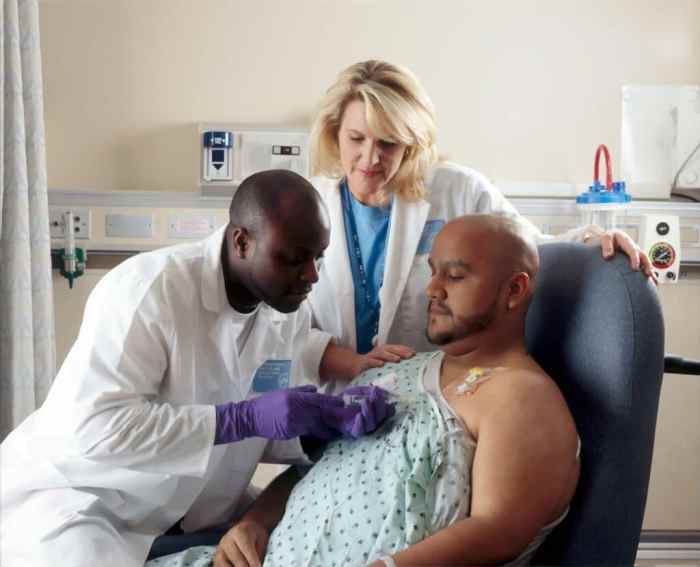Clases de cna en español – Welcome to the world of Spanish CNA classes, where healthcare takes a compassionate and culturally sensitive turn. As we delve into the intricacies of this field, you’ll discover the profound impact these classes have on Spanish-speaking communities and the rewarding career opportunities that await you as a Spanish-speaking CNA.
Our journey begins with a comprehensive overview of the role and responsibilities of a CNA, emphasizing the critical need for Spanish-language proficiency in today’s diverse healthcare landscape. We’ll explore the benefits of becoming a Spanish-speaking CNA, empowering you to make a meaningful difference in the lives of those you serve.
Spanish CNA Classes

Certified Nursing Assistants (CNAs) are essential members of the healthcare team, providing direct patient care under the supervision of registered nurses or licensed practical nurses. They perform a variety of tasks, including assisting with bathing, dressing, feeding, and other activities of daily living.
CNAs also monitor patients’ vital signs, assist with wound care, and provide emotional support.
Spanish-language CNA classes are vital for Spanish-speaking communities. These classes provide students with the language skills and cultural knowledge they need to succeed in the healthcare field. Spanish-speaking CNAs can better communicate with patients and their families, providing a higher level of care.
Benefits of Becoming a Spanish-Speaking CNA
- Increased job opportunities in Spanish-speaking communities
- Improved communication with patients and families
- Enhanced cultural understanding and sensitivity
- Greater job satisfaction and career advancement opportunities
Types of Spanish CNA Classes
Spanish CNA classes are offered in various formats to accommodate different learning styles and schedules. Each type of class has its own advantages and disadvantages.
Online Spanish CNA Classes
*
-*Duration
Clases de CNA en español son una excelente manera de mejorar sus habilidades de enfermería. Si bien aprender español es un gran beneficio, también es importante aprender sobre diferentes culturas. Por ejemplo, ¿sabía que el bột chiên giòn tiếng anh es un plato popular en Vietnam? Esta es solo una de las muchas cosas que aprenderá al tomar clases de CNA en español.
Typically 4-8 weeks
-
-*Cost
Varies depending on the provider, but generally less expensive than in-person classes
-*Curriculum
Covers the same material as in-person classes, but with more flexibility and self-paced learning
Advantages:* Flexibility: Students can learn at their own pace and on their own schedule.
Convenience
Students can access the course materials and complete assignments from anywhere with an internet connection.
Lower cost
Online classes are often less expensive than in-person classes.Disadvantages:* Lack of face-to-face interaction: Students may miss out on the opportunity to interact with instructors and classmates.
Technical issues
Students may encounter technical difficulties that can interrupt their learning.
Self-discipline required
Students need to be self-motivated and disciplined to complete the course successfully.
In-Person Spanish CNA Classes
*
-*Duration
Typically 4-8 weeks
-
-*Cost
More expensive than online classes
-*Curriculum
Covers the same material as online classes, but with more hands-on training
Advantages:* Face-to-face interaction: Students can interact with instructors and classmates, which can be helpful for learning and networking.
Hands-on training
Students can practice skills in a supervised setting.
Structured environment
Students benefit from a structured learning environment with regular class times and assignments.Disadvantages:* Less flexibility: Students must attend classes at scheduled times and locations.
Higher cost
In-person classes are more expensive than online classes.
Commuting
Students may have to commute to class, which can be inconvenient and time-consuming.
Hybrid Spanish CNA Classes
*
-*Duration
Typically 4-8 weeks
-
-*Cost
Varies depending on the provider, but generally more expensive than online classes but less expensive than in-person classes
-*Curriculum
Combines online and in-person instruction
Advantages:* Flexibility: Students can complete some of the coursework online at their own pace and attend in-person classes for hands-on training.
Convenience
Students can access the course materials and complete assignments from anywhere with an internet connection.
Hands-on training
Students can practice skills in a supervised setting.Disadvantages:* Less face-to-face interaction than in-person classes: Students may miss out on some of the benefits of interacting with instructors and classmates in person.
Technical issues
Students may encounter technical difficulties that can interrupt their learning.
Self-discipline required
Students need to be self-motivated and disciplined to complete the course successfully.
Finding Spanish CNA Classes
Finding reputable Spanish CNA classes can be a challenge, but it is possible with some research and effort. Here are some tips to help you find the right class for you:
1. Ask for recommendations from friends, family, or other healthcare professionals.They may know of a good Spanish CNA class in your area.
2. Search online for Spanish CNA classes in your area.There are a number of websites that list CNA classes, including those that are taught in Spanish.
3. Contact local community colleges and vocational schools.They may offer Spanish CNA classes as part of their healthcare programs.
4. Contact local hospitals and nursing homes.They may offer Spanish CNA classes to their employees or to the general public.
5. Check with local organizations that serve the Hispanic community.They may know of Spanish CNA classes in your area.
Assessing the Quality of a Spanish CNA Class
Once you have found a few potential Spanish CNA classes, it is important to assess their quality before enrolling. Here are some factors to consider:
- The reputation of the school or organization offering the class.Research the school or organization online to see if they have any complaints or negative reviews.
- The experience of the instructors.Make sure the instructors have experience teaching Spanish CNA classes and that they are fluent in Spanish.
- The curriculum of the class.The curriculum should cover all of the topics required by the state in which you will be working as a CNA.
- The cost of the class.Compare the cost of the class to other similar classes in your area.
- The schedule of the class.Make sure the schedule of the class fits your needs.
Curriculum of Spanish CNA Classes
Spanish CNA classes typically consist of a comprehensive curriculum that covers the essential knowledge and skills required to become a certified nursing assistant. The curriculum is designed to provide students with a solid foundation in patient care, safety, and ethics.The
curriculum is divided into several modules or units, each of which focuses on a specific aspect of CNA work. The core components of a typical Spanish CNA class curriculum include:
Basic Nursing Skills
This module covers the fundamental nursing skills that CNAs need to perform their duties effectively. Topics include:
- Taking vital signs
- Assisting with bathing, dressing, and grooming
- Providing personal care
- Feeding and hydration
- Wound care
- Medication administration
Patient Safety and Infection Control
This module focuses on ensuring the safety of patients and preventing the spread of infection. Topics include:
- Patient rights and responsibilities
- Infection control procedures
- Body mechanics and safe patient handling
- Emergency procedures
Communication and Interpersonal Skills
This module emphasizes the importance of effective communication and interpersonal skills in providing quality patient care. Topics include:
- Verbal and nonverbal communication
- Cultural sensitivity
- Conflict resolution
- Working effectively as part of a team
Legal and Ethical Issues, Clases de cna en español
This module covers the legal and ethical responsibilities of CNAs. Topics include:
- Patient confidentiality
- Informed consent
- End-of-life care
- Abuse and neglect reporting
Clinical Experience
In addition to classroom instruction, Spanish CNA classes typically include a clinical component where students gain hands-on experience working with patients under the supervision of a registered nurse. Clinical experiences may take place in a variety of settings, such as hospitals, nursing homes, and assisted living facilities.
Certification and Licensing for Spanish-Speaking CNAs

Spanish-speaking Certified Nursing Assistants (CNAs) must meet specific requirements and pass certification exams to practice legally. This ensures they possess the necessary knowledge, skills, and competency to provide quality care to patients.
To obtain certification, Spanish-speaking CNAs typically follow these steps:
Educational Requirements
- Complete a state-approved CNA training program that meets the required curriculum and training hours.
- Demonstrate proficiency in both English and Spanish languages.
Certification Exam
After completing the training program, CNAs must pass a certification exam administered by a nationally recognized organization, such as:
- National Nurse Aide Assessment Program (NNAAP)
- National Council of State Boards of Nursing (NCSBN)
- Prometric
The certification exams typically include both written and skills components, testing knowledge and practical abilities in areas like patient care, communication, and infection control.
Background Check
In addition to passing the certification exam, CNAs must undergo a background check to verify their criminal history and ensure they are eligible for licensure.
Continuing Education
Once certified, CNAs are required to complete continuing education courses to maintain their certification and stay up-to-date on industry best practices.
Career Opportunities for Spanish-Speaking CNAs: Clases De Cna En Español

Spanish-speaking CNAs are in high demand in various healthcare settings due to the increasing population of Spanish-speaking patients. They play a vital role in providing culturally competent care, bridging language barriers, and ensuring the well-being of Spanish-speaking communities.
Career opportunities for Spanish-speaking CNAs are diverse and include:
Hospitals
- Assisting with patient care, including bathing, dressing, feeding, and monitoring vital signs
- Providing emotional support and cultural interpretation to Spanish-speaking patients and their families
- Collaborating with other healthcare professionals to ensure comprehensive care
Nursing Homes
- Providing daily care to elderly residents, including assistance with activities of daily living, medication management, and social engagement
- Building relationships with residents and their families, fostering a sense of belonging
- Advocating for the rights and well-being of Spanish-speaking residents
Home Health Agencies
- Providing in-home care to Spanish-speaking patients, assisting with personal care, medication administration, and wound care
- Educating patients and their families on health management and disease prevention
- Collaborating with other healthcare professionals to ensure continuity of care
Testimonials
“As a Spanish-speaking CNA, I feel a deep sense of purpose in helping Spanish-speaking patients navigate the healthcare system and feel understood. My ability to speak their language allows me to connect with them on a personal level and provide culturally sensitive care.”– Maria, Spanish-Speaking CNA
“The demand for Spanish-speaking CNAs is growing rapidly, and I am grateful for the opportunities this career has provided me. I am proud to be part of a healthcare team that values diversity and inclusivity.”– Juan, Spanish-Speaking CNA
Resources for Spanish-Speaking CNAs

Navigating the healthcare industry as a Spanish-speaking CNA can present unique challenges. Fortunately, there are numerous resources and organizations dedicated to supporting and empowering Spanish-speaking CNAs in their professional development.
These resources provide a range of services, including training, certification assistance, continuing education opportunities, and networking platforms. By leveraging these resources, Spanish-speaking CNAs can enhance their skills, advance their careers, and better serve the diverse communities they work with.
Online Forums and Communities
Connecting with other Spanish-speaking CNAs can be invaluable for sharing experiences, seeking advice, and staying informed about industry trends.
- National Association of Hispanic Nurses (NAHN): NAHN provides a dedicated online forum for Spanish-speaking nurses and CNAs to connect and share resources.
- Latinx in Healthcare: This online community connects healthcare professionals from the Latinx community, including CNAs, to foster networking and professional growth.
- Spanish-Speaking CNA Facebook Groups: There are several active Facebook groups where Spanish-speaking CNAs can engage in discussions, ask questions, and share job opportunities.
Continuing Education Opportunities
Pursuing continuing education is essential for CNAs to stay up-to-date with the latest healthcare practices and enhance their skills.
- Community Colleges: Many community colleges offer Spanish-language CNA training programs and continuing education courses for certified CNAs.
- Online Learning Platforms: Several online learning platforms offer Spanish-language CNA courses and certifications.
- Workshops and Seminars: Organizations like NAHN and the National Council of State Boards of Nursing (NCSBN) host workshops and seminars tailored to the needs of Spanish-speaking CNAs.
Answers to Common Questions
What are the benefits of becoming a Spanish-speaking CNA?
Spanish-speaking CNAs bridge communication gaps, provide culturally sensitive care, and enhance patient satisfaction in Spanish-speaking communities.
What types of Spanish CNA classes are available?
Classes range from online to in-person and hybrid formats, varying in duration, cost, and curriculum. Choose the option that best suits your learning style and schedule.
How can I find reputable Spanish CNA classes?
Seek recommendations from healthcare professionals, consult with local community colleges or vocational schools, and check online directories for accredited programs.
What is the certification process for Spanish-speaking CNAs?
To become certified, you must pass a state-approved exam and meet specific education and experience requirements. Different certification organizations offer exams tailored to Spanish-speaking candidates.
What career opportunities are available to Spanish-speaking CNAs?
Spanish-speaking CNAs are in high demand in hospitals, nursing homes, assisted living facilities, and home healthcare agencies, providing essential care to a growing Spanish-speaking population.